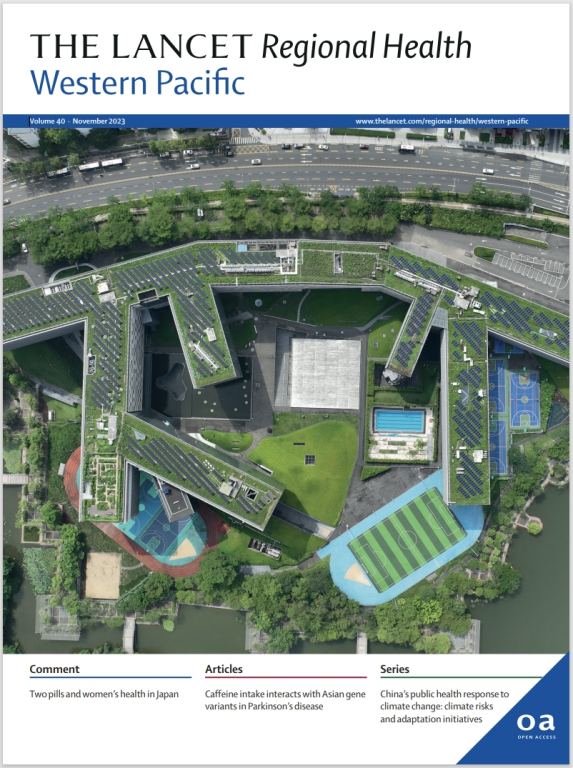
The Lancet Series on Climate Change and Health Adaptations in the Western Pacific Region
On November 18th, the Tsinghua Vanke School of Public Health (VSPH) together with The Lancet held a launch event for The Lancet Series on Climate Change and Health Adaptations in the Western Pacific Region. This timely brought together a collaborative network of 101 scholars from six countries: Australia, China, Japan, New Zealand, Singapore, and Vietnam. The topic is specifically to generate evidence for better health adaptation to climate change for each local context, considering diverse policies, unique regional demographics, and health impacts of climate change. The hybrid event had onsite 70 persons in attendance in the Mingli Building, and attracted an online audience surpassing 60,000.
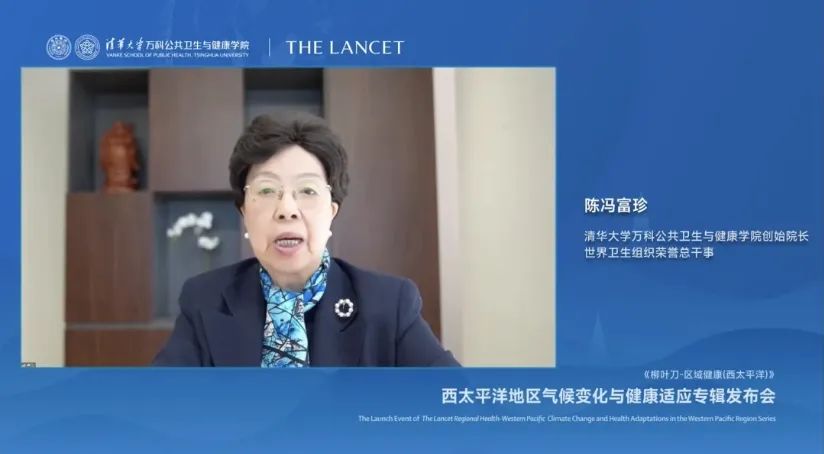
Video address from Margaret Chan
Margaret Chan, founding dean of VSPH and former Director-General of the World Health Organization (WHO), opened the conference with a key address. She praised The Lancet for its assembly of authors and the groundbreaking findings they presented, while also advocating for robust climate action. Chan underscored the imperative to confront global climate change during this crucial period, emphasizing the need for health adaptation strategies that are specifically designed for the unique and varied contexts of the Western Pacific region. She conveyed optimism that the scholarly insights shared at the conference would guide effective policy-making, thereby making a substantial contribution to global efforts.
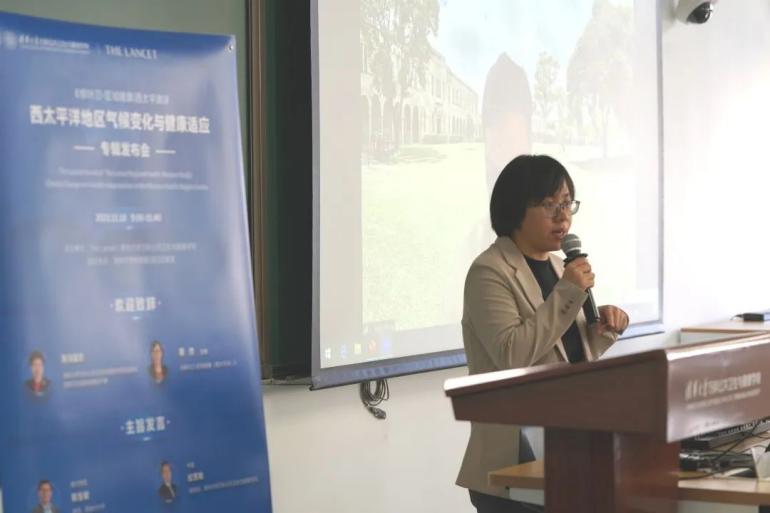
Cai Jie hosts the event
Cai Jie, Editor-in-Chief of The Lancet Regional Health - Western Pacific, detailed the origins of the series, tracing its inception to a lab visit at Tsinghua University in November 2021. She chronicled the development, noting the numerous collaborative meetings and extensive dialogues spanning two years that shaped its creation. Cai stressed the importance of scientific evidence in guiding policy decisions and resource allocation. Underlining the journal's commitment to making a difference, she noted that the series on Climate Change and Health Adaptation in the Western Pacific region represents a significant regional collaboration on adaptation.

John Ji elaborates the series
John Ji, associate professor at VSPH initiated the series in time before COP28, where assembling a diverse group of contributors. Upon completion, he was struck by the diversity of issues and the myriad of unique adaptation solutions that emerged, observing both shared approaches and distinct strategies across different countries. Ji highlighted two key areas for future research. Firstly, he noted that while each country has developed new national adaptation strategies, many lack program evaluation for health impact. Secondly, he observed that some countries and islands could not have sufficient peer-reviewed evidence, and to address this gap, he expressed his intention to foster increased regional collaboration in the future. In his presentation, Ji focused on China's report, emphasizing the criticality of addressing climate change risks to sustain the country's public health advancements. He proposed a strategic set of eight adaptation initiatives.
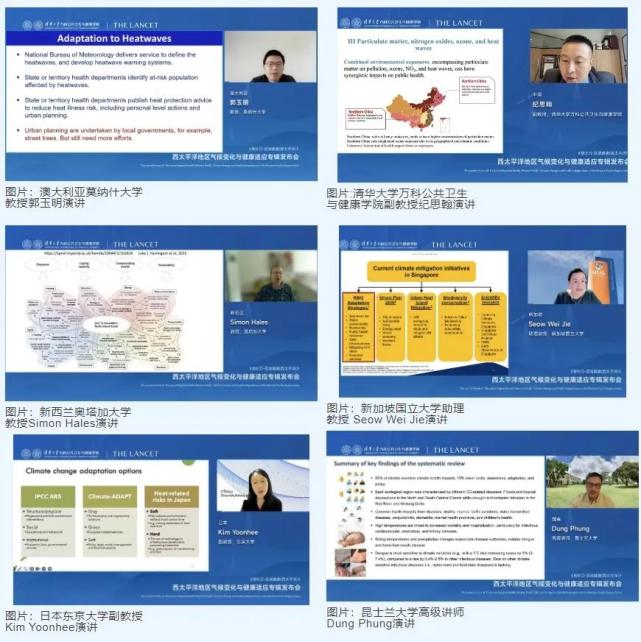
Each country report was allocated a 15-minute presentation, with speakers including Guo Yuming from Monash University for Australia; John Ji from VSPH for China; Yoonhee Kim from the University of Tokyo for Japan; Simon Hales from the University of Otago for New Zealand; Seow Wei Jie from the National University of Singapore for Singapore; and Dung Phung from the University of Queensland for Vietnam. The panel discussion was led by Professor Huang Cunrui from VSPH and Chen Mengji, technical officer of Innovation and Research at the World Health Organization. These moderators delved into the barriers and best practices for strengthening the climate resilience of health systems and identifying and scaling adaptation measures to address the impacts of climate change on human health. An emerging theme was that the biomedical model of health does not suffice for climate change adaptation, as non-health sectors such as urban planning, environment, and building significantly affect health adaptation strategies.

Group photo of part of the participants
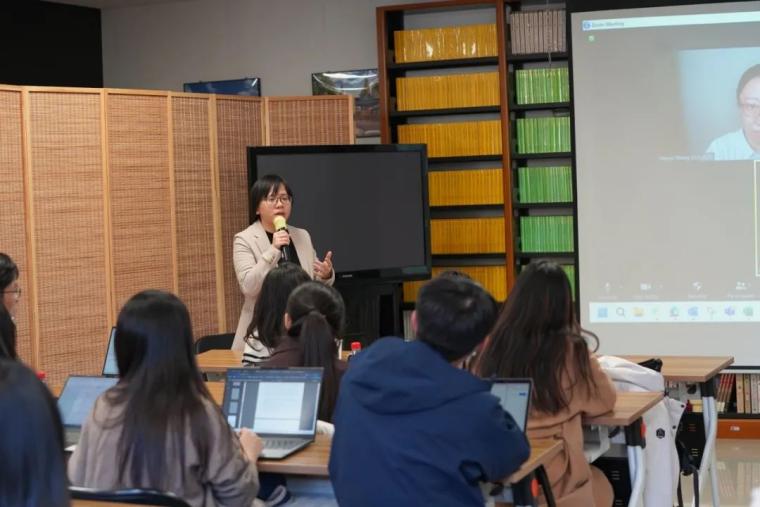
Interaction with editors from the Lancet
The day concluded with an opportunity for the Tsinghua community to interact with editors from The Lancet at the Li Wenzheng Library. Here, over 30 people engaged in a meet-the-editors session. Cai Jie and Wang Haoyu, from The Lancet Planetary Health, discussed career paths in academia, explored The Lancet's current research focus areas, and provided valuable insights into the world of academic publishing.
Link: https://www.thelancet.com/journals/lanwpc/article/PIIS2666-6065(23)00299-7/fulltext
China's Eight Climate Change Adaptation Initiatives
1.Carbon neutrality and health co-benefits:
By 2030, China aims to increase the share of non-fossil fuels in primary energy consumption to around 25%, increase forest stock volume by 6 billion cubic meters compared to 2005 levels, and reduce carbon dioxide emissions per unit of GDP by more than 65% compared to 2005 levels. These actions have direct and indirect effects on health.
2.Improved early warning systems:
An early warning system is a critical component of disaster risk reduction, providing timely and accurate information about various extreme weather events. These events include heatwaves, cold spells, typhoons, heavy rainfall, severe thunderstorms, blizzards, strong winds, sandstorms, and more. The reports advocates for a relative rather than absolute temperature threshold for non-optimal temperature warnings.
3.Cities and spatial planning as protection against extreme weather events:
Over the past decades China has also developed urban construction strategies such as low-carbon cities and sponge cities to secure the resilience of cities to climate change and promote the well-being of the public. Effective urban planning, including proper building layouts, urban sky corridors, and vertical greenery, enhances air circulation, reduces pollutants, and mitigates the heat island effect, thus improving the local microclimate.
4.Optimize indoor environments:
Indoor environments are essential for adaptation by providing a safe and secure shelter during extreme weather events; optimal indoor environments can improve public health and safety. Emerging technologies such as air purifiers need to be evaluated.
5.Natural vegetation, green space, and cooling infrastructure:
Pilot programs for eco-cities and sponge cities are initiatives to incorporate strategies such as green roofs and walls, modifications to building form and layout, and the use of heat-resistant construction materials to improve energy efficiency, reduce the urban heat island effect, and manage stormwater runoff. Increasing vegetative cover in urban areas, such as dividers in busy roads, around community centers, can also have multiple benefits, including lowering outdoor temperatures, reducing demand for building cooling, and sequestering carbon while managing run-off and pollution.
6.Raise public awareness and protect vulnerable populations from climate-related risks:
Identifying populations and locations at high risk of heat vulnerability is crucial for effective interventions. Being aware of climate change is frequently seen to be crucial for gaining public support for programs of mitigation and adaptation. In China, climate change awareness varies, and attention has been on AQI and school children, and heatwave and pre-term births.
7.Environmental engineering technologies for health:
Advancing environmental technologies and safeguarding public health are interconnected. It is important to note that while novel technologies for climate adaptation are necessary, their potential environmental and health impacts are not yet fully understood and require further assessment.
8.Government academic partnership in science, technology, and policy:
It is essential for scientists and policymakers to work collaboratively to answer specific research questions oriented toward the development of adaptation policies. Addressing climate-related health issues requires a coordinated effort across all government departments, and “health for all” should be integrated into decision-making processes in environmental, urban planning, energy, transport, and public health.
Special gratitude is extended to the distinguished Tsinghua authors whose substantial contributions played a pivotal role in shaping this special issue:
John S. Ji, Associate Professor, VSPH
Xia Yanjie, Assistant Researcher, VSPH
Liu Linxin, Ph.D. student, VSPH
Zhou Weiju, Assistant Researcher, VSPH
Long Ying, Associate Professor, School of Architecture
Ma Yue, Ph.D. student, School of Architecture
Zhao Bin, Professor, School of Architecture
Jiang Jingkun, Professor, School of Environment
Xu Lei, Associate Professor, VSPH
Ma Jian, Assistant Researcher, VSPH
Zheng Guangjie, Assistant Professor, School of Environment
Margaret Chan, Founding Dean, VSPH
Liang Wannian, Executive Vice Dean, VSPH
Huang Cunrui, Assistant Dean and Professor, VSPH